Learn about the people, places and events that have shaped the experience of Black residents in Eugene. Introduced in 2021, the Strides for Social Justice app is a unique program of local running, walking, cycling and wheelchair routes designed to explore local history, strengthen health and open the heart.
The routes vary in length, but each tour includes a historical synopsis of the sites and landmarks along the way. All the routes can be enhanced by adding guided exercises and reflections from the app tour guides Denise Thomas and Dr. Yvette Alex-Assensoh to add to your walking, running or cycling.
Thomas is the owner of Let's Move Fitness and executive director of Healthy Moves. Dr. Yvette Alex-Assensoh, is the Vice President for Equity & Inclusion at the University of Oregon and the powerhouse behind the L.A.C.E. framework.
Strides for Social Justice is a collaboration between PeaceHealth and Eugene Marathon. Many members of the Black community and local organizations came together to develop the content including, but not limited to, the Strides for Social Justice steering committee; Eugene/Springfield NAACP; Healthy Moves; Let's Move Fitness; I Too, Am Eugene; L.A.C.E.; and Oregon Black Pioneers.
To begin, simply download the app and choose from the list of available tours. We've included a synopsis of each below to get you started.
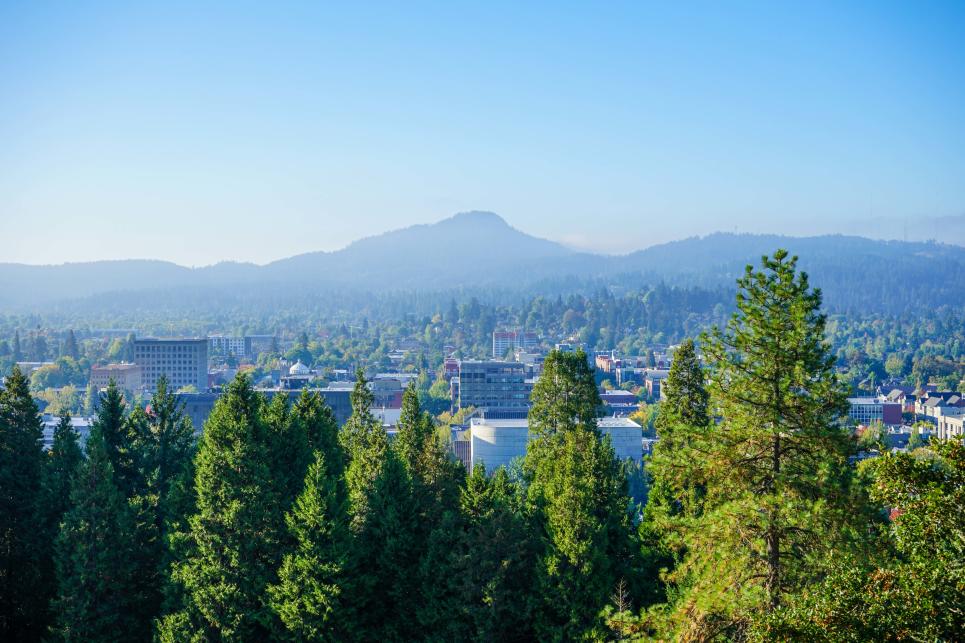
Skinner Butte viewpoint park
Skinner Butte Tour
The shortest tour in the collection is this one-stop exploration of Eugene's sprawling riverside park. Skinner Butte Park has miles of paved flat riverfront paths for rolling, running or strolling, and wide-open parkland for stretching. Embark on the short but steep climb (not paved) to the top of Skinner Butte to take in the view of downtown Eugene.
Skinner Butte, originally called "Ya Po Ah", was re-named after Eugene Skinner established Eugene as a town. This area was stewarded by the Kalapuya people before white settlers moved into the Willamette Valley. This tour will review the history of the Black experience in Eugene at the turn of the century, a time when local Black residents were faced with the hardships of living in a community that had an active KKK presence.
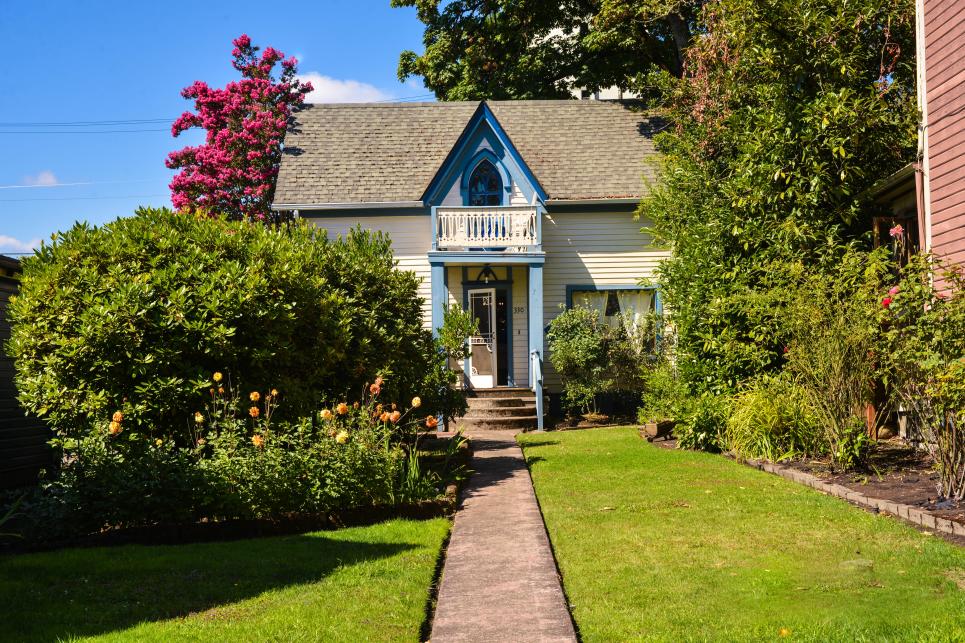
The Historic Mims House, an early Black-owned residence, is preserved as a museum.
Downtown Eugene Tour
This six-stop route combines well with the Skinner Butte tour, maximizing running through the riverfront park into the heart of downtown Eugene. Visit the locations of Eugene's first Black communities and homes, and learn about the lives of their residents. Discover the challenges they faced, the discrimination, and the contributions that they made to the growing city. This tour also allows you to explore tributes to other locally and nationally recognized heroes of Black equality and justice.
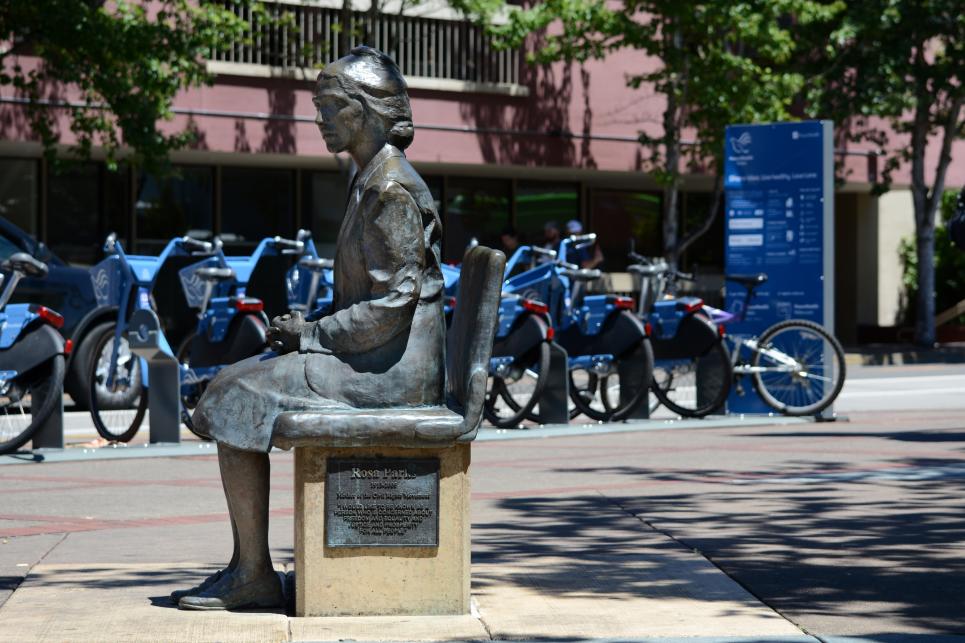
Rosa Parks Statue at the Downtown Eugene Bus Station
Conclude your adventure for the day with a meal at one of the region's Black-owned businesses. Noisette is a French-style bakery with delicious baked goods, soups and sandwiches, or head to the Once Famous Grill for some favorite food truck fare.
For a bonus stop while you are downtown (this is not on the app tour), check out the magnificent Martin Luther King Jr. mural on Oak St (cross street is 11th Ave). This artistic tribute was painted as part of Eugene's 20x21 EUG legacy mural project that brought in street artists from around the world to create over twenty paintings for the World Athletics Championships Oregon22, which took place in the summer of 2022 at Hayward Field.
UO Academics & Student Life Tour
This robust tour covers a two-mile loop beginning and ending at the Lylle Reynolds-Parker Black Cultural Center on the University of Oregon campus which opened in 2019. Start with easy loosening and limbering up exercises, then set out to visit significant landmarks commemorating the evolving Black experience at the University of Oregon.
Mabel Byrd was the first Black student to attend the UO in 1917. For decades, Black students were barred from living in campus dormitories. Today, you can run by the 2021 residence hall named after DeNorval Unthank, the first Black graduate in 1951 from UO's architecture department. Along with later serving as an associate professor here, Unthank contributed to the design of many area buildings including the Lane County Courthouse, and several schools and campus buildings.
While you are on campus, don't forget to visit the Jordan Schnitzer Museum of Art and The Museum of Natural and Cultural History. The 2021 Black Lives Matter exhibit from the Jordan Schnitzer can still be experienced virtually, and likewise MNCH's "Racing to Change - Oregon's Civil Rights Years" is also still available in an online format.
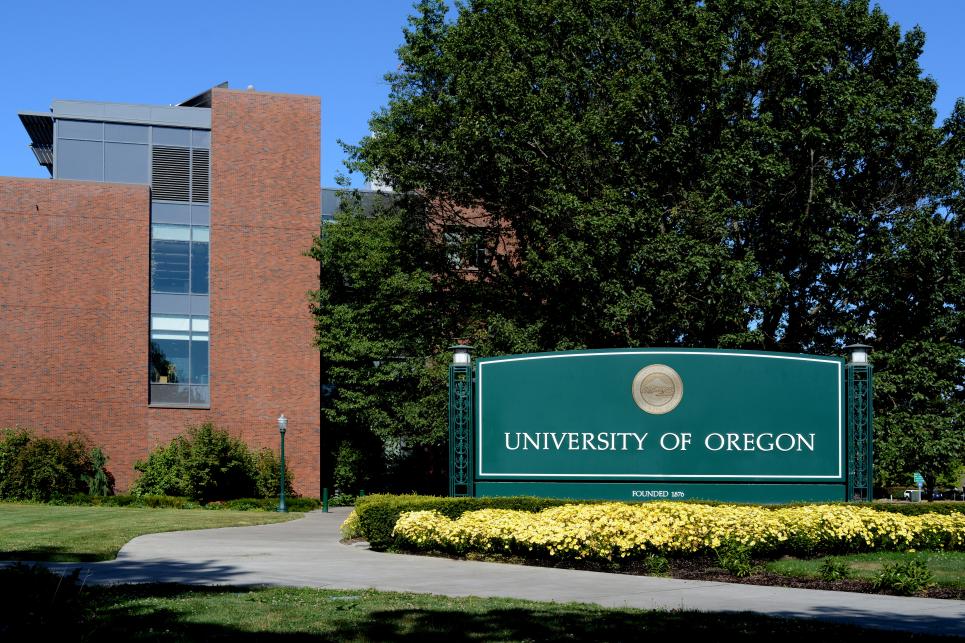
University of Oregon Campus
UO Athletics Tour
This sports-specific tour highlights the UO's past and present-day Black athletes. Start off at Hayward Field (the adjacent Hayward Hall has a track museum) with a collection of stretches utilized in track and field, softball and baseball, basketball and football. Move between six sports stadiums, fields and facilities while learning about the lives and accomplishments of the UO's Black athletes — and the many firsts from participation to breaking records to Olympic recognition and more.
West Eugene Tour
The West Eugene Tour focuses on the Reynolds family, one of many Black families that migrated here in the 1940s. Despite facing discrimination, they contributed to Eugene's development, including establishing a local congregation. Generations later, the family continues to be active in Eugene.
The four stops include a church, memorial plaques, a street named for Sam Reynolds and the site of a future park named for his wife Mattie Reynolds. Once again, pause to exercise and reflect on the early beginnings of this family's life in Eugene and their legacy in our community.
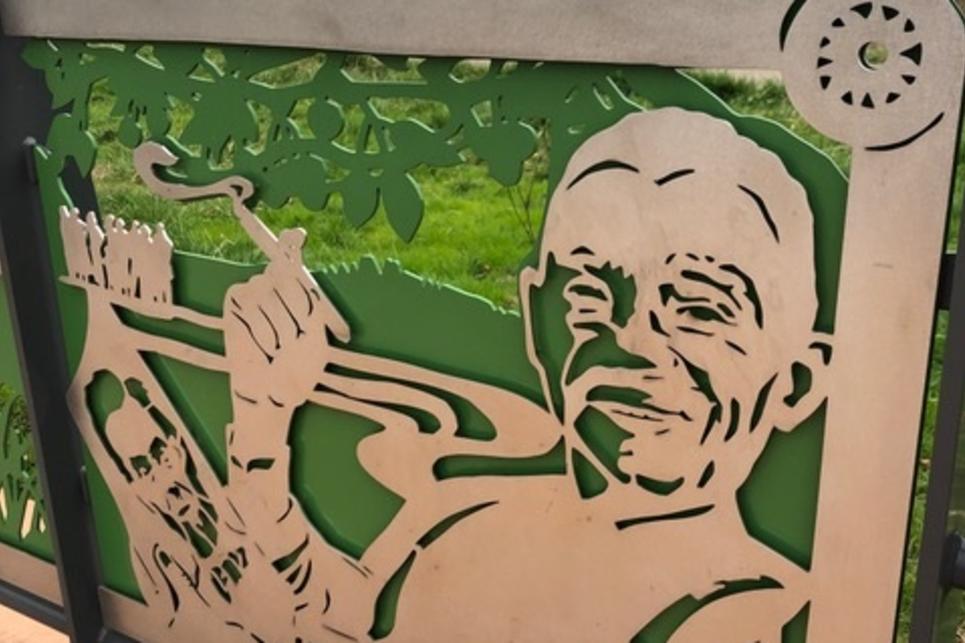
Sam Reynolds Metal Sculpture at the Sam Reynolds Bus Station
Westmoreland Park Tour
The Westmoreland Park route honors two standout Eugene residents, in academics and in sports, who have achieved esteemed recognition. First visit the Boys & Girls Club Community Center dedicated to Dr. Edwin Coleman Jr. who earned his degree from the University of Oregon and later developed the University's Department of Ethnic Studies. While viewing the colorful murals on the sides of the center, learn more about Dr. Coleman's community contributions, academic accomplishments and the hardships he faced from racism.
Next, run a few laps on the Margaret Johnson Bailes Track near the Academy of Technology & the Arts middle school. Johnson Bailes is Oregon's only female track athlete to date who has set world records and won an Olympic Gold Medal. Learn more about her life story, her drive to succeed and her milestones right here in Eugene. Her namesake track was funded by a Nike grant and is surfaced through Nike's Reuse-A-Shoe recycling program.
South Eugene Tour
Beloved and well-known in the community, Wiley Griffon is honored on this route. Eugene's first Black resident recorded in local history by name, he worked as a mule-streetcar driver and University of Oregon janitor in the early 1900s. Visit a mural memorializing his life, do some stretches, explore Eugene's oldest cemetery to see his memorial, and reflect on what living in Eugene was like for Wiley Griffon during the time of Black exclusion.
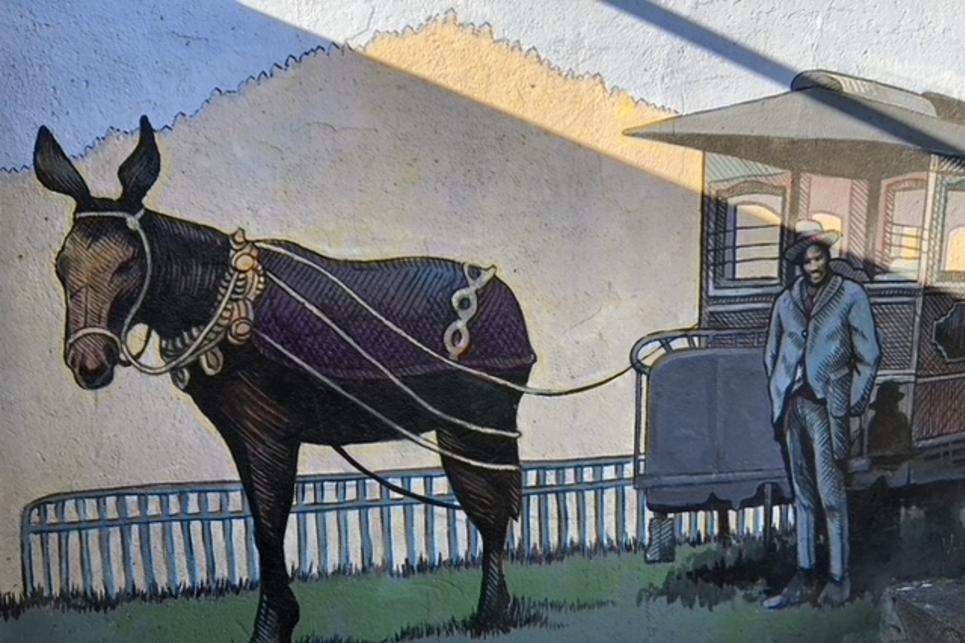
Wiley Griffon by artist Ila Rose
Download the App
The Strides for Social Justice app is an ongoing, evolving project, with plans to continually add new content and even expand to other communities beyond Eugene. The app provides links to local organizations, scholarships and Black-owned businesses. It is available in the App Store or on Google Play.
Support the Eugene-Springfield Black Community
- Visit a local diverse business
- Connect with the Eugene-Springfield NAACP
- Learn about the Oregon Black Education Foundation
- Share what you learned through the Strides for Social Justice tours
